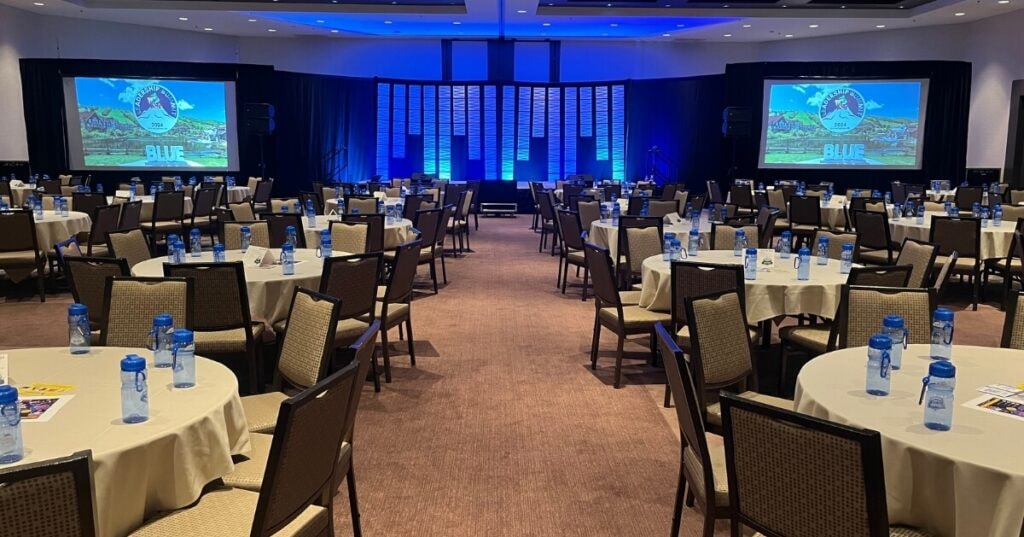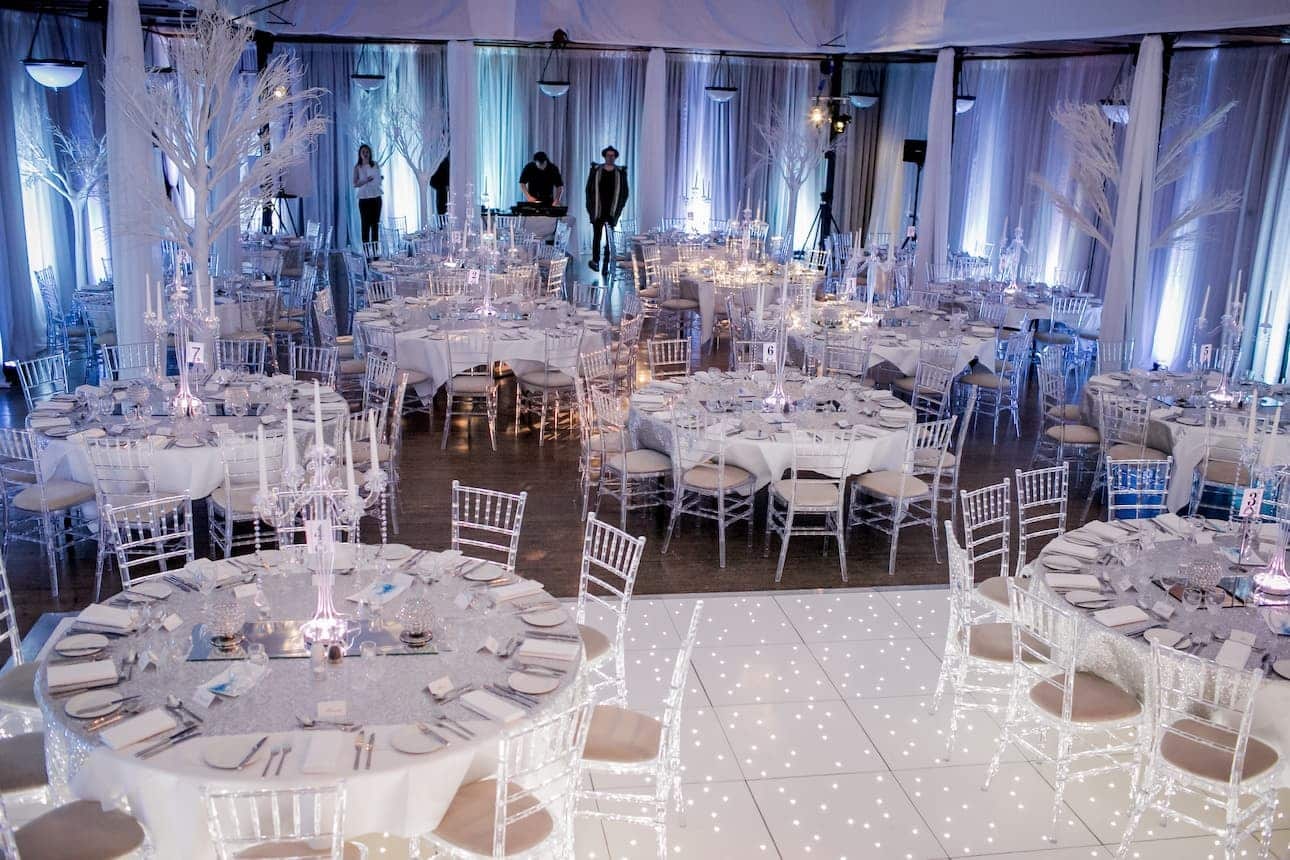Event Planning Checklist – start planning your event with our event planning checklist. We divided event planning activities for several stages:
- planning your event
- preparing your event
- day before the event
- one hour before the event
- during the event
- after the event
Whether you’re a seasoned event planner or not quite sure where to start, an event checklist will always be your best friend when planning a private or corporate event, especially when inviting special guests. Corporate events play a crucial role in office event planning and team engagement. Utilizing tools like the deskbird app can help manage and promote these events, ensuring employees are informed and can plan accordingly. It’s all too easy to overlook the small things when planning an event, and a checklist will ensure everything is under control at all times – so you can stress less.
This blog post serves as a step-by-step guide for anyone planning an event, starting with defining the event name.

Here at CHEFIN we’ve organised and catered for countless events, and we know the ins and outs of every bit of the process. We’ve created this event checklist as a comprehensive roadmap to manage and plan your event, from beginning to end.
Why Use an Event Planning Checklist?
Planning a corporate event, private party, or conference? Then you need a reliable event planning checklist—your ultimate roadmap to success. With so many moving parts involved, it’s easy to overlook crucial details. Missing just one small task can disrupt your entire event.
That’s why we created this simple, step-by-step event checklist designed to keep you organized and stress-free. Unlike complex templates that cause more confusion than clarity, our checklist is easy to follow and divided into three intuitive sections:
Before the event, during the event, and after the event.
Print it out, highlight tasks by priority (e.g. pink for high priority, yellow for low), and cross them off as you go. Whether you’re an experienced event planner or a first-time host, this tool will help you manage every aspect of your event—from initial concept to final follow-up.
Use this guide to walk through the entire process, and grab the printable event checklist at the end to make your planning even smoother.
FUNDAMENTALS FOR BEING A INCREDIBLE EVENT MANAGER
BEFORE THE EVENT
1. SETTING THE FOUNDATION
Setting the foundation for a event is crucial. This involves defining the event’s purpose, objectives, and target audience. It’s essential to establish a clear understanding of what the event aims to achieve and who it’s intended for. This will help guide the planning process and ensure that all decisions align with the event’s goals.
To set the foundation, consider the following steps, including estimating how many attendees will be present :
- Define the event’s purpose and objectives: Clearly outline what you want to achieve with your event. Are you aiming to raise awareness, generate leads, or celebrate a milestone?
- Identify the target audience and their needs: Understand who your attendees are and what they expect from the event. This will help tailor the event to meet their preferences.
- Establish a clear event concept and theme: Decide on a theme or concept that aligns with your event’s purpose and resonates with your audience.
- Determine the event’s format and structure: Will it be a conference, workshop, gala, or networking event? Plan the structure accordingly, and consider the location and its accessibility for attendees to ensure everyone can easily reach the venue.
- Select the event’s date carefully: Choosing the right event’s date is essential, as it can significantly impact attendance and the overall success of your event.
- Set a realistic budget and timeline: Outline your financial plan and create a timeline to keep the planning process on track.
By setting a solid foundation, you’ll be able to create a comprehensive event plan that meets the needs of your attendees and achieves your event’s objectives. These foundational decisions will influence various aspects of the event, such as catering, accommodation, and transportation.
A. Budgeting and Financials
A well-structured budget is the backbone of any successful event. During the event planning process, it’s essential to create a comprehensive budget that accounts for every possible expense, from venue rental and catering services to entertainment and event technology. Don’t forget to include smaller costs like decorations, transportation logistics, and promotional materials, as these can add up quickly.
To safeguard your event’s financial stability, always allocate a 10% buffer for unexpected costs. This ensures you’re prepared for any last-minute changes or emergencies that may arise. Regularly review and update your budget throughout the planning process, tracking expenses and making adjustments as needed to stay on target.
Effective cost management and diligent expense tracking will help you avoid overspending and keep your event on track for success. By prioritizing financial planning, you’ll set the stage for a smooth and successful event from start to finish.
B. Team Management
Behind every successful event is a well-coordinated team. Effective team management is crucial in the event planning process, ensuring that every detail is handled efficiently and nothing falls through the cracks. Start by establishing a clear hierarchy and defining roles for each event planner and team member. Assign specific tasks and set deadlines so everyone knows exactly what’s expected of them.
Regular team meetings and open communication are key to keeping everyone on the same page. Use project management tools to track progress, delegate responsibilities, and address any challenges as they arise. Collaboration and strong leadership will help your team work together seamlessly, making the planning process smoother and more enjoyable for everyone involved.
By fostering a culture of teamwork and clear communication, you’ll empower your team to deliver a successful event that exceeds expectations.
To further enhance team efficiency and ensure flawless event execution, consider implementing a centralized event management platform. These tools allow for real-time collaboration, streamlined task tracking, and instant updates—especially useful for large-scale corporate events or multi-day conferences. Features like shared calendars, document repositories, and communication logs can drastically reduce planning errors and boost overall productivity. Leveraging the right event planning software not only strengthens team coordination but also helps deliver a professional, high-impact event experience from start to finish.
C. Venue Selection
Selecting the right venue is a pivotal decision that can make or break your event’s success. When evaluating potential venues, consider factors such as location, capacity, amenities, and how well the space aligns with your event’s objectives. The venue should comfortably accommodate your expected number of attendees and offer the necessary facilities for your event type, whether it’s a corporate event, gala, or workshop.
Before making a final decision, visit the venue in person to inspect the space and ensure it meets your requirements. Pay attention to details like accessibility, parking, and on-site support. Carefully review and negotiate the venue contract to include all essential provisions, such as setup times, security needs, and cancellation policies.
Choosing the right venue sets the tone for your event and ensures a positive experience for all attendees.
In addition to logistics, think about the atmosphere and branding potential of the venue. A well-chosen event space can elevate the overall guest experience and reinforce your event’s theme. For example, a modern venue with natural light may be ideal for a corporate conference, while a historic building could add charm to a private celebration or networking event. Make sure the venue supports your event technology needs—like Wi-Fi, AV equipment, and staging—and offers flexibility for custom décor and signage. Prioritizing a venue that aligns with your event branding can significantly boost attendee satisfaction and leave a lasting impression.
2. PLANNING YOUR EVENT
Pre event planning is a critical phase for organizing your event objectives, logistics, and creating checklists to ensure everything runs smoothly.
When planning your event, you want to first consider a theme. If you don’t have or need a theme, consider a colour palette. If you plan on using an event decorator, this is the time to find and secure a decorating service.
Consider the time of day your event will take place, guest list, VIPs, and whether you will need an MC. If so, find and contact someone appropriate, working out times and prices beforehand. Setting up a registration system at this stage is important for managing sign-ups and attendee information efficiently.
If you will need to hire a venue, consider your budget. If you plan on serving food at your event, consider your food budget and find a good catering service. For out-of-town guests or speakers, make necessary accommodation arrangements to ensure their comfort and punctuality.
During the planning phase, also set up essential logistics such as registration areas and signage to facilitate smooth event operations.
Don’t forget to develop a detailed event timeline and run sheet to keep everything on track from setup to wrap-up. This should outline key milestones, vendor arrival times, speaker schedules, catering service windows, and any scheduled entertainment. A structured timeline not only keeps your event planning checklist organized but also helps with on-the-day coordination, ensuring each team member knows their role and timing. By integrating this timeline with your broader event management strategy, you’ll reduce stress, avoid last-minute surprises, and deliver a polished, professional experience for every guest.
A. Technology and Audiovisual
In today’s world, technology and audiovisual equipment are essential components of a incredible event. As an event planner, it’s important to ensure that all necessary equipment—such as microphones, projectors, and screens—is available and functioning properly before the event day. Consider incorporating event technology like event apps, social media walls, and live streaming to enhance engagement and create a memorable experience for your guests.
Work closely with your venue and vendors to coordinate the setup and integration of all technical elements. Make sure you have access to technical support throughout the event to quickly resolve any issues that may arise. Leveraging the right event technology not only streamlines operations but also boosts attendee satisfaction and social media buzz.
By prioritizing technology and audiovisual planning, you’ll deliver a seamless and interactive event that leaves a lasting impression.
Additionally, integrating interactive technology solutions—such as live polling, digital Q&A sessions, and real-time feedback tools—can significantly increase attendee participation and engagement. These features are especially valuable for corporate events and conferences, where audience interaction enhances the overall experience and provides actionable insights. Investing in user-friendly event tech platforms that sync with mobile devices ensures your guests stay informed, involved, and connected throughout the event. With the right combination of audiovisual equipment and interactive tools, you’ll elevate the event experience and strengthen your brand’s reputation for innovation and professionalism.

B. Catering and Beverages
Food and beverages are a highlight of any event, and thoughtful planning in this area can elevate the entire guest experience. Choose catering services that align with your event’s theme, budget, and attendee preferences. As an event planner, it’s essential to consider dietary restrictions and special requests, ensuring that all guests feel included and cared for.
Work closely with your chosen caterer to finalize menu options, serving times, and presentation details. Clearly communicate all arrangements to your guests, including information about dietary accommodations and beverage options. Confirm logistics such as serving food on site, glassware needs, and whether you’ll be serving alcohol.
By paying attention to every detail in your catering and beverage planning, you’ll create a welcoming atmosphere and contribute to your event’s overall success.
3. PREPARING YOUR EVENT
Marketing and promotion are critical components of a successful event, including sending out press announcements . A well-planned marketing strategy can help increase ticket sales, boost attendance, and create a buzz around the event. Developing a comprehensive marketing plan is essential to guide your promotional efforts and ensure all activities are strategically aligned.
To create an effective marketing and promotion plan, consider the following steps:
- Develop a marketing strategy that aligns with the event’s objectives: Ensure your marketing efforts are focused on achieving the event’s goals.
- Identify the target audience and their preferred communication channels: Understand where your audience spends their time online and offline, and leverage social media platforms such as Facebook, Instagram, and Twitter for event promotion and engagement.
- Create engaging content: Develop compelling social media posts, email marketing campaigns, and updates for your event website to attract and engage your audience.
- Utilize event marketing tools: Leverage event listing websites, online advertising, and other tools to reach a wider audience.
- Monitor and adjust the marketing strategy as needed: Track the performance of your marketing efforts and make necessary adjustments to improve results.
By implementing a comprehensive marketing and promotion plan, you’ll be able to reach your target audience, increase ticket sales, and create a successful event, setting the stage for your next event . Additionally, tracking brand mentions online can help you measure the reach and impact of your event marketing, providing valuable insights into audience engagement and event success.
4. A DAY BEFORE THE EVENT
Send a reminder to all your guests, confirm all details with your venue, staff, photographers/DJs, caterers, etc. Check that the venue kitchen is suitable for your caterers, and be sure to leave space in the fridge! After confirming these details, update your stakeholders or team members with the final registration numbers to ensure everyone is prepared.
Have your venue fully decorated and ready to go by the end of the day. Put up all necessary seating and signage, and if there will be kids at the event, consider entertainment, toys, and snacks.

5. ONE HOUR BEFORE THE EVENT
Check that the caterer has arrived and food is under control. Make sure that reception is ready to greet guests, and test the microphone and speakers to ensure they’re working.
Look over all facilities, including emergency exits, bathrooms, lifts, lights, and so on, and contact the venue manager for information on emergency procedures. Finally, make sure all staff is in position and ready to go.
6. DURING THE EVENT
Meet and greet your guests, introduce them, allow them to network. Providing networking opportunities is essential for attendees to make meaningful connections and engage with each other. Liaise with waitstaff to ensure food is equally distributed to all guests in the room, and rubbish/plates are put away promptly.
Organise to have someone at the back of the room to keep the audience quiet during speaking and ensure all event details are in order . Speaker introductions play a key role in engaging both the speakers and the audience, ensuring smooth moderation and event flow. If you see any guests who are alone or look shy, approach them and make them feel welcome.
7. EVENT EXECUTION
Event execution is the final stage of the event planning process. It’s essential to ensure that all the details are in place and that the event runs smoothly.
To ensure successful event execution, consider the following steps:
- Confirm all event details: Double-check the event schedule, venue, and logistics, including managing event logistics such as registration, communication, and administrative coordination, to ensure everything is in order.
- Coordinate with vendors and suppliers: Ensure timely delivery of goods and services by maintaining clear communication with all vendors and suppliers.
- Confirm the venue: For off site events, pay special attention to transportation arrangements and coordination with external vendors.
- Conduct a thorough risk assessment: Identify potential risks and develop a contingency plan to address any issues that may arise.
- Train event staff and volunteers: Ensure everyone involved knows their roles and responsibilities to keep the event running smoothly.
- Monitor the event’s progress: Keep an eye on the event’s progress and be prepared to make adjustments as needed.
By paying attention to the details and being prepared for any unexpected issues, you’ll be able to deliver a successful and memorable event.

AFTER THE EVENT
8. AFTER THE EVENT CHECKS
Check the venue for any belongings left behind, and make sure the caterer cleans up after themselves. As part of your post event follow up, send a follow-up email to your guests thanking them for attending, and include a call-to-action. Get photos/videos from your photographer and share with guests.
Post event follow up activities are crucial. Acknowledge contributions in thank-you notes and evaluate the event’s success to maximize opportunities for publicity, fundraising, and member development that arise from the event. Remember, no two events are the same, so each follow-up should be tailored to the specific event’s outcomes and feedback.
Too much hassle finding and dealing with caterers? Contact us! No event is too big or small, and with tonnes of experience in event catering, our process is easy. So you can have one less thing to worry about for your event.
Download event planning checklist: The-Ultimate-Event-Planning-Checklist
Need more help or information on choosing the best dining style for your corporate catering event? Get in touch with us today for advice and an obligation-free quote.
Planning for Event Success: Final Steps to Long-Term Impact
Planning a successful event doesn’t end when the last guest leaves, it continues through strategic follow-up and evaluation. To truly maximize the return on your efforts, you must assess every aspect of your event planning process, from attendee engagement to budget performance and marketing effectiveness.
Start by conducting a post-event survey to gather feedback and gauge attendee satisfaction. This insight is essential for identifying both strengths and areas for improvement. Then, review the event budget to evaluate cost efficiency and ROI, ensuring future events can be even more optimized.
Analyze the performance of your event marketing strategy, looking at reach, conversion, and engagement rates. These data points will inform smarter promotional efforts moving forward. Use defined event success metrics such as guest attendance, social media buzz, and sponsor feedback to measure the true impact of your event.
Finally, document all findings and incorporate them into a forward-thinking plan. This helps build a repeatable framework for your next event and strengthens relationships with potential event sponsors aligned with your goals and audience.
By closing the loop with a data-driven approach, you’re not just finishing one event, you’re laying the foundation for consistent success in future corporate events, private functions, and conferences. The end of one event marks the beginning of smarter, more strategic event planning.